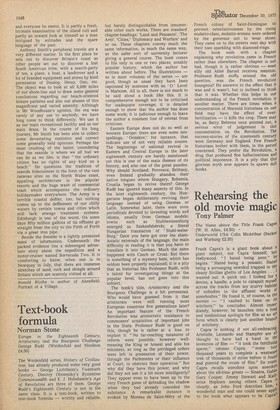Text-book formula
Norman Stone
Europe in the Eighteenth Century, Aristocracy and the Bourgeois Challenge George Rude (Weidenfeld and Nicolson £4.50) The Weidenfeld series, History of Civilization, has already produced some very good books — George Lichtheim's Twentieth Century, Dimitry Obolensky's Byzantine Commonwealth and E. J. Hobsbawm's Age of Revolution are three of them. George Rude's Eighteenth Century is not in the same class. It is a text-book, written to text-book formula — worthy and reliable, but barely distinguishable from innumerable other such works. There are standard chapter-headings: 'Land and Peasants', 'The Arts', 'Cities,' Diplomacy and Warfare' and so on. These chapters convey much the same information, in much the same way, as the safer sort of university lecturer giving a general course. The book comes to life only in one or two places, notably popular history, which the author has written about before. The illustrations — as in most volumes of the series — are good, though as usual they have been captioned by someone with an ' 0 ' Level in Marxism. All in all, there is not much to be said about a book like this. It is comprehensive enough not to be criticized for inadequate coverage; it is detailed enough to show that the author has done some work; it is judicious enough to leave the author a constant line of retreat from criticism.
Eastern Europe does not do so well as western Europe: there are even some misspellings, ' Oczakov,' for instance, that indicate use of not very reliable sauces. The beginnings of national revival in Eastern and Central Europe in the later eighteenth century are barely mentioned: yet this is one of the main themes of its history, and also one of the great puzzles. Why should Scotland, Provence, Brittany, even Ireland gradually abandon their native tongues where Hungary, Bohemia, Croatia began to revive theirs? George Rude has ignored many aspects of this. In the later eighteenth century, the Hungarians began deliberately reviving their language instead of using German or Latin. Somewhat later, there were even periodicals devoted to inventing word,s and idioms, usually from German models; towns such as Stuhlweissenburg emerged as Szekesfehervar, a literal Hungarian translation of ' Stuhl-weissBurg.' Once you have got over the shamAsiatic externals of the language, the main difficulty in reading it is that you have to translate it into German. Much the same happened with Czech or Croat. But there is something of a mystery here, which has seldom been properly explained; it is a pity that an historian like Professor Rude, with a talent for investigating things at the popular level, has not gone into this subject.
The book's title, Aristocracy and the Bourgeois Challenge is a bit portentous. Who would have guessed from it that aristocrats were still running most European countries five generations later? An important feature of the French Revolution was aristocratic resistance to commoners' acquisition of important jobs in the State. Professor Rude is good on this, though he is rather at a loss to explain it: "No far-reaching measures of reform were possible, however well meaning the King or honest and able his ministers, so long as the privileged orders were left in possession of their power, through the Parlements or their influence at Court, to obstruct their operation." But why did they have this power, and why did they not use it a bit more intelligently? They appear even to have been up to the very French game of defending the shadow when they had already conceded the substance. A remarkable instance is evoked by Moreau de Saint-Mery of the French colony of Saint-Domingue: to prevent ostentatiousness by the rising mulatto-class, mulatto-women were ordered by the governor not to wear shoes. They came on to the streets next day with their toes sparkling with diamond-rings.
The book ends with a chapter explaining why revolution came in France rather than elsewhere. The chapter is not bad, though it is rather obvious — even silly old Abbe Baruel receives mention. Professor Rude sniffs around the old question, was the French revolution bourgeois? He answers to the effect that it was and it wasn't, but is inclined to think that it was. Whether this helps in our understanding of the French revolution is another matter. There are times when a concentration of Marxoid historians on one field may have the effect of overfertilization — it kills the crop. There may be, as Betty Behrens once pointed out, a serious error of judgement in this concentration on the Revolution. The success-stories of the nineteenth centurY were Germany and England. Few French historians bother with them, in the period concerned. They prefer the Revolution, a drug that produced fine hallucinations and political impotence. It is a pity that this glorious myth now appears to spawn dull books.


































 Previous page
Previous page